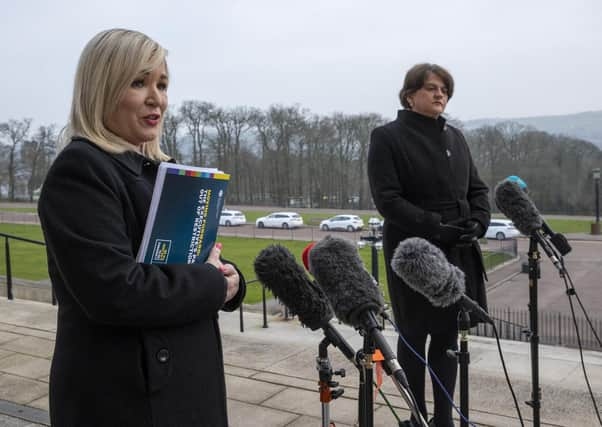Arlene Foster and Michelle O’Neill split head of civil service role, step back from interviewing – and open way for pay hike


Last September the first and deputy first ministers failed to appoint anyone to the role, leaving the civil service leaderless until they agreed on a temporary replacement, former utility regulator Jenny Pyper.
Uniquely in the UK, several years ago the DUP and Sinn Fein changed the rules around appointing the top civil servant to allow them to personally interview and select the winner, despite the post and the civil service requiring political neutrality.
Advertisement
Hide AdAdvertisement
Hide AdThree civil servants got to the final interview with the first minister and the deputy first minister – but for reasons which were never publicly explained at the time, none of them were appointed.
That politicisation of the process and the fact that the ministers had failed in nine months to make a decision led to significant disquiet within the Northern Ireland Civil Service.
That led to a review of the role of head of the civil service which has led to a decision – which has not yet been announced – to split what until now have been the responsibilities of that position.
There will now be an additional permanent secretary post created – with the title ‘Second Permanent Secretary’ in Mrs Foster and Ms O’Neill’s department, The Executive Office, and they will be responsible for running the department.
Advertisement
Hide AdAdvertisement
Hide AdThat will leave the head of the civil service to largely focus on running the civil service, alongside acting as chief civil service adviser to the first and deputy first ministers, and acting as secretary to the Executive.
A key part of the role will be reform of an institution whose credibility has been devastated by revelations surrounding the RHI scandal.
In an advertisement published two weeks ago without fanfare,
Mrs Foster and Ms O’Neill had already hiked the salary for the post to a possible £188,272 a year. However, they have now opened the door to increasing the salary even further - despite having now reduced the workload of the role. The job advertisement says that “A higher starting salary may be available for an exceptional candidate” – with no upper limit opening them to a negotiation without clearly defined parameters.
Advertisement
Hide AdAdvertisement
Hide AdBut the most significant change has been in an agreement by Mrs Foster and Ms O’Neill not to conduct the final interviews. Instead, there will now be a ‘structured conversation’ with the ministers for candidates who pass the first interview stage.
The final interviews will then be conducted by a panel on which the ministers will not sit.
However, there is opacity as to their precise role because the candidate handbook refers to the final interview being “informed” by the “structured conversations with ministers” before putting before the ministers a list of those “suitable for appointment”, ranked in order of merit. Mrs Foster and Ms O’Neill will then be the final decision-makers.
The decision by Arlene Foster and Michelle O’Neill to be less involved in selecting the head of the civil service has been welcomed by the trade union which represents senior civil servants.
Advertisement
Hide AdAdvertisement
Hide AdDave Penman, general secretary of the FDA, had sharply criticised the ministers for politicising the situation. Yesterday he said: “We welcome the approach being adopted ... [which] provides a difficult balance between ministerial confidence in the outcome of any selection, without it ultimately becoming a political appointment.”
He said it was right that the ministers wanted to influence the selection process because the post-holder would be their senior advisor, but that “civil servants must, however, be able to serve different ministers and Executives, and be free to provide their best impartial, objective advice without fear or favour”.
READ MORE:
Advertisement
Hide AdAdvertisement
Hide AdLeaked internal DUP minutes show fear of looming electoral collapse, and dismay at party’s direction
Advertisement
Hide AdAdvertisement
Hide Ad——— ———
A message from the Editor:
Thank you for reading this story on our website. While I have your attention, I also have an important request to make of you.
Advertisement
Hide AdAdvertisement
Hide AdWith the coronavirus lockdown having a major impact on many of our advertisers — and consequently the revenue we receive — we are more reliant than ever on you taking out a digital subscription.
Subscribe to newsletter.co.uk and enjoy unlimited access to the best Northern Ireland and UK news and information online and on our app. With a digital subscription, you can read more than 5 articles, see fewer ads, enjoy faster load times, and get access to exclusive newsletters and content. Visit https://www.newsletter.co.uk/subscriptions now to sign up.
Our journalism costs money and we rely on advertising, print and digital revenues to help to support them. By supporting us, we are able to support you in providing trusted, fact-checked content for this website.
Alistair Bushe
Editor